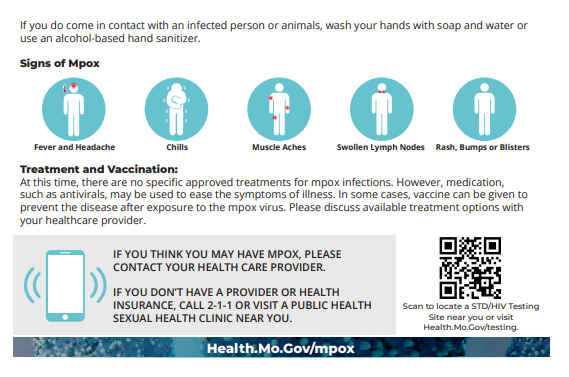MPox
previously called monkeypox
Mpox is a rare disease and overall risk to the public remains low.
From CDC.gov/poxvirus/monkeypox
What is Mpox?
Mpox (previously called monkeypox) is a rare disease caused by infection with the mpox virus. Mpox virus is part of the same family of viruses as variola virus, the virus that causes smallpox. Mpox symptoms are similar to smallpox symptoms, but milder, and mpox is rarely fatal. People with mpox often get a rash, along with other symptoms. Mpox is not related to chickenpox.
Mpox was discovered in 1958 when two outbreaks of a pox-like disease occurred in colonies of monkeys kept for research. Despite being named “monkeypox,” the source of the disease remains unknown. However, African rodents and non-human primates (like monkeys) might harbor the virus and infect people.
The first human case of mpox was recorded in 1970. In 2022, mpox spread around the world. Before the 2022 outbreak, mpox had been reported in people in several central and western African countries. Previously, almost all mpox cases in people outside of Africa were linked to international travel to countries where the disease commonly occurs or through imported animals. These cases occurred on multiple continents.
There are 2 types of mpox: clade I and clade II.
Clade I is responsible for the current rise of cases in Central and Eastern Africa. Historically, clade I caused higher numbers of severe illnesses than clade II, with up to 10% of people dying from it. Recent outbreaks have seen much lower death rates of about 1-3.3%.
Clade II is the type that caused the global outbreak that began in 2022. Infections from clade II mpox are less severe. More than 99.9% of people survive. Clade II is endemic to West Africa.
What you need to know
CDC is tracking an outbreak of mpox that has spread across several countries that don’t normally report mpox, including the United States.
The mpox virus is spreading mostly through close, intimate contact with someone who has mpox.
You can take steps to prevent getting mpox and lower your risk during sex.
CDC recommends vaccination for people who have been exposed to mpox and people who are at higher risk of being exposed to mpox.
If you have any symptoms of mpox, talk to your healthcare provider, even if you don’t think you had contact with someone who has mpox.
CDC is urging healthcare providers in the United States to be alert for patients who have rash illnesses consistent with mpox.
Source: https://www.cdc.gov/mpox/index.html
Page last reviewed 02/27/2025




